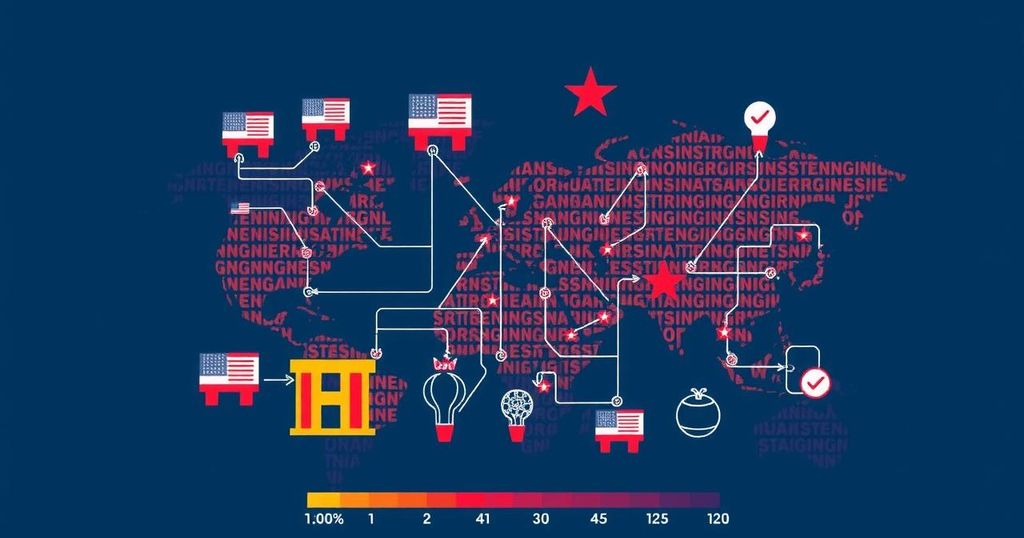The Global Stakes of the U.S. Election: An International Perspective

The U.S. presidential election outcomes, whether in favor of Vice President Kamala Harris or former President Donald J. Trump, will have widespread implications globally, affecting conflicts in Gaza and Ukraine, climate policies, and international trade. The world watches closely to discern the trajectory of U.S. foreign policy, anticipating the influence on Israel, Russia, Ukraine, China, Europe, Africa, Mexico, and climate initiatives, all of which may shift significantly depending on the election results.
The repercussions of the upcoming U.S. presidential election extend beyond American borders, influencing global dynamics in significant ways. Regardless of whether Vice President Kamala Harris or former President Donald J. Trump ascends to the presidency, their decisions will reverberate internationally, affecting issues ranging from armed conflicts in Gaza and Ukraine to climate policy and international trade frameworks. Globally, there is keen interest in understanding the future trajectory of American power. The question arises: was Donald Trump’s presidency an outlier in the context of U.S. leadership, or does Joe Biden’s tenure represent an aberration? Conversations among foreign correspondents underscore the pivotal choice facing American voters this election cycle, a choice that polarizes not only the U.S. but also the global community, often in unforeseen ways. Israel features prominently; opinion polls suggest a significant preference among Israelis for Donald Trump. Nevertheless, regardless of the election outcome, the enduring stance of Israeli society against Palestinian statehood indicates that any U.S. president may face limitations in effecting real change. President Harris is expected to exert pressure for negotiations, yet she is unlikely to withdraw military aid, while Trump might adopt a more lenient position towards Israeli settler expansion. Russia and Ukraine share an intertwined fate in this election landscape. Trump’s dismissal of Ukraine’s autonomy raises fears that a Trump administration would broker a disadvantageous peace deal with Russia, while Ukrainians hope that Harris would maintain U.S. support amid ongoing conflict. Interestingly, Vladimir Putin perceives both candidates as potentially less committed to aiding Ukraine compared to Biden, suggesting he could view a Harris presidency as more negotiable. China’s perspective on the election reveals division; while a Trump victory could intensify trade conflict through heavy tariffs, it would also signal a possible reduction in U.S. alliance-building that constrains China regionally. Conversely, a Harris administration may reinforce existing alliances yet maintain targeted tariffs, indicating a complex landscape for U.S.-China relations post-election. In Europe and NATO, the implications of the election suggest an epochal shift. European leaders express trepidation at Trump’s potential return, fearing his rhetoric could empower far-right extremism and jeopardize trade relationships. Harris’s presidency may not significantly alter this trajectory, with many anticipating a focus on domestic affairs. Global Trade is at a crossroads; Trump’s aggressive tariff promises would disrupt existing structures and foment international trade wars. Conversely, Harris’s approach suggests continuity with Biden’s policies that prioritize national security over unrestricted trade. Africa, particularly South Africa, exhibits contrasting views regarding the candidates. Trump’s brash demeanor resonates with autocratic leadership styles, while Harris’s heritage and experience in Zambia endear her to many. Trump’s isolationist policies may complicate partnerships, particularly as emerging economies seek ties with BRICS nations. Mexico stands on precarious ground, facing heightened tension regardless of the victor. Harris’s administration would likely mirror Biden’s restrictive policies on immigration, while Trump’s known threats could result in significant economic and diplomatic repercussions. Finally, climate change remains a dire concern. The U.S., as a historic leader in carbon emissions, holds significant influence over global climate goals. Harris is likely to pursue vigorous environmental policies, while Trump may roll back regulations, risking acceleration in climate crises. In conclusion, the decision made by American voters will hold monumental implications for the future of global governance, stability, trade relations, and climate policies. The dynamics will necessitate careful observation from the world as they wait to see how the United States positions itself under new leadership.
The ongoing turmoil surrounding the U.S. elections touches upon a myriad of global issues, illustrating that American presidential choices can significantly affect international relations. With two fundamentally different candidates expected to bring contrasting policies, the implications of U.S. leadership extend far beyond its borders, into regions plagued by conflict, economic dependencies, and environmental crises. The analysis of foreign correspondents aids in unraveling these potential outcomes, highlighting the nuanced and often complex ways in which global perceptions influence and are influenced by U.S. electoral decisions.
The upcoming U.S. election is pivotal, not just for the nation but for the world at large. Based on the perspectives from various international stakeholders, it is clear that the election will shape multiple facets of global affairs, including geopolitical alignments, economic relations, and climate action. With both candidates representing divergent paths, their decisions will resonate globally, drawing increased scrutiny from international observers and potentially redefining alliances and rivalries.
Original Source: www.nytimes.com








